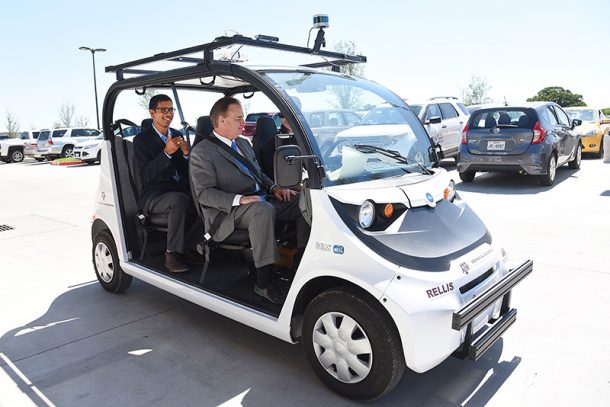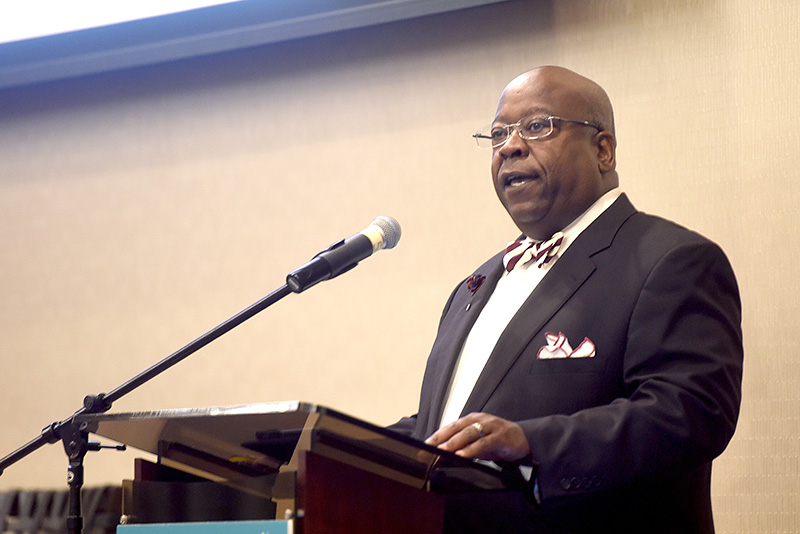
It’s a foregone conclusion among many transportation experts that connected and automated vehicles (CAVs) will be commonplace within the next decade. CAV technologies promise not only to make our transportation system more efficient, but also to save lives and reduce the systemwide costs associated with transportation.
To grapple with the complexities associated with CAV adoption, more than 200 transportation technology leaders from academia, the private sector and public agencies gathered in College Station, Texas, May 4–5 for the Second Annual Texas A&M Transportation Technology Conference hosted by the Texas A&M Transportation Institute (TTI), and also sponsored by The Texas A&M University System, Texas A&M University and the Texas A&M Engineering Experiment Station. The conference highlighted the role of infrastructure and identified research needs and partnership opportunities to advance the study, testing and deployment of CAV technologies. Attendees discussed the opportunities and challenges for all three sectors as transportation faces its most revolutionary period since the advent of the horseless carriage.
Texas A&M University System Vice Chancellor and Dean of Engineering M. Katherine Banks and TTI Agency Director Greg Winfree welcomed a standing-room-only crowd to the conference. Over the course of two days, industry experts addressed how innovation and transforming systems must intersect, the role research plays in a technological revolution, and how investment in infrastructure will be key to safely transitioning yesterday’s roadways to tomorrow’s connected network. Speakers from 3M, Cisco, DENSO, Ericsson, GM, IBM, Mobis, Nissan, Toyota, Lyft, Uber, and leaders from federal, state and local transportation agencies also looked at topics like automation safety, cybersecurity and human/vehicle interaction.

“No other transportation innovation in modern history has generated more fascination than the prospect of self-driving cars, but this is about more than just personal travel—it’s also about meeting consumer needs,” said Texas A&M System Chancellor John Sharp. “Autonomous travel will drastically transform how we move both people and products, and we’re conducting research and testing at the A&M System’s RELLIS Campus to carefully manage that transformation.”
The Texas A&M Transportation Technology Advisory Council conducted its premiere meeting on the second day of the conference. Comprised of leaders in the transportation technologies industry from both the private and public sectors, the council will provide cross-cutting guidance to TTI and the A&M System as the agencies conduct CAV research at Texas A&M’s new flagship RELLIS Campus.
“The council is a unique group that transcends sectors, interests and areas of expertise,” explained TTI Assistant Director Christopher Poe, who helped organized the conference. Poe is TTI’s connected and automated transportation strategy lead. “Its leadership will prove essential in helping guide The Texas A&M University System on the RELLIS Campus development, Texas A&M University on technology deployment, and TTI on connected and automated transportation research.”
To cap off the conference, TTI conducted the first public demonstration of truck platooning in Texas, which involves electronically linking a series of big rig trucks. Truck platooning applies self-driving vehicle technology to enable one manually driven truck to lead other trucks in a tight formation, allowing drivers of the platoon trucks to disengage from the driving task. The demonstration was sponsored by the Texas Department of Transportation (TxDOT).
“Increased trade and freight movement continue to place ever-greater demand on our roadway system,” said Winfree. “By reducing both fuel consumption and driver fatigue and by increasing roadway capacity, truck platooning will help to make our use of that system safer and more efficient.”
In the very near future, officials expect a growing level of autonomous-vehicle testing and development in Texas, which earlier this year was designated a national Automated Vehicle Proving Ground. The Texas AV Proving Ground Partnership involves TTI, TxDOT, The University of Texas Center for Transportation Research and the Southwest Research Institute. The RELLIS Campus will be the center of the A&M System’s contributions in the partnership. | View KBTX-TV Story on Autonomous Vehicles and Truck Platooning

